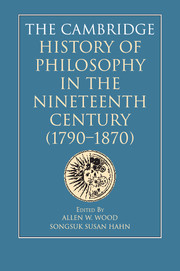Book contents
- Frontmatter
- Contents
- Contributors
- Preface
- Abbreviations
- Introduction
- I Philosophy in the Nineteenth Century
- II Logic and Mathematics
- III Nature
- IV Mind, Language, and Culture
- V Ethics
- VI Religion
- VII Society
- 19 Philosophical Responses to the French Revolution
- 20 The Decline of Natural Right
- 21 Conceptions of Society in Nineteenth-Century Social Thought
- 22 Nineteenth-Century Political Economy
- 23 The Nation-State
- 24 Nineteenth-Century Ideals
- 25 Social Dissatisfaction and Social Change
- VIII History
- References
- Index
- References
20 - The Decline of Natural Right
from VII - Society
Published online by Cambridge University Press: 05 December 2012
- Frontmatter
- Contents
- Contributors
- Preface
- Abbreviations
- Introduction
- I Philosophy in the Nineteenth Century
- II Logic and Mathematics
- III Nature
- IV Mind, Language, and Culture
- V Ethics
- VI Religion
- VII Society
- 19 Philosophical Responses to the French Revolution
- 20 The Decline of Natural Right
- 21 Conceptions of Society in Nineteenth-Century Social Thought
- 22 Nineteenth-Century Political Economy
- 23 The Nation-State
- 24 Nineteenth-Century Ideals
- 25 Social Dissatisfaction and Social Change
- VIII History
- References
- Index
- References
Summary
INTRODUCTION
In a preface he wrote in October 1894 to his book Natural Rights: A Criticism of Some Political and Ethical Conceptions, David G. Ritchie (sometime professor of logic and metaphysics at the University of St. Andrews) made the following observation:
When I began, some three years ago, to write a paper on “Natural Rights,” … I had a certain fear that in criticizing that famous theory I might be occupied in slaying the already slain. Recent experience has, however, convinced me that the theory is still, in a sense, alive, or at least capable of mischief. Though disclaimed by almost all our more careful writers on politics and ethics, it yet remains a commonplace of the newspaper and the platform, not only in the United States of America, where the theory may be said to form part of the national creed, but in this country, where it was assailed a century ago by both Burke and Bentham.
Is Ritchie correct in his claim that the theory of natural right never really died in the nineteenth century? It certainly suffered grievous injury at the end of the eighteenth century at the hands of thinkers like Edmund Burke and Jeremy Bentham. But how telling were their blows? In this chapter I shall consider what happened to the theory in the century following the attacks by Burke and Bentham.
Both of those critics – the traditional conservative and the utilitarian radical – were responding to natural right as it figured in the ideology of the French Revolution. In 1789 Edmund Burke wanted the world to know that “Englishmen at least are not the converts of Rousseau; we are not the disciples of Voltaire…. Atheists are not our preachers; madmen are not our lawgivers…. In England we have not yet been completely embowelled of our natural entrails…. We have not been drawn and trussed, in order that we may be filled, like stuffed birds in a museum, with chaff and rags and paltry blurred shreds of paper about the rights of man…. We have real hearts of flesh and blood beating in our bosoms. We fear God; we look up with awe to kings; with affection to parliaments; with duty to magistrates; with reverence to priests; and with respect to nobility.”
- Type
- Chapter
- Information
- Publisher: Cambridge University PressPrint publication year: 2012
References
- 6
- Cited by



